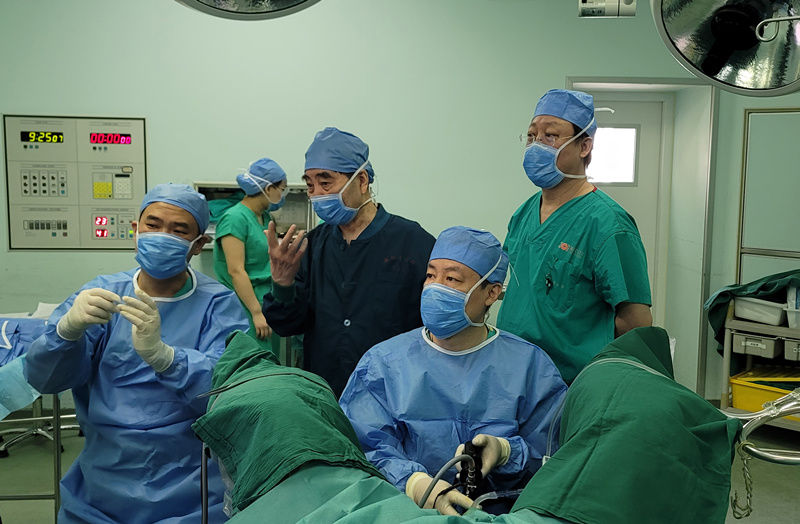Recently, in the anesthesia operating room of the Third Medical Center of the PLA General Hospital, Professor Wang Xiaoxiong, a member of the expert group of the General Hospital and the former director of the Department of Urology, was in command. Transurethral bladder tumor resection was successfully performed, and the patient’s bladder was preserved again. Professor Wang Xiaoxiong’s 30-year story of meticulous diagnosis and treatment for patients has been passed down in the Department of Urology, and technological innovation and inheritance have also become commonplace in the Department.

30 years ago, a 33-year-old patient was diagnosed with “muscle-invasive bladder cancer” and had been treated in many major hospitals in China, all of which were Cystectomy and urinary diversion are recommended. The patients found Professor Wang Xiaoxiong from the Department of Urology of the People’s Liberation Army General Hospital. Professor Wang has deep attainments in the diagnosis and treatment of bladder cancer, kidney cancer, prostate cancer and other urogenital tumors, deformities, obstructive diseases and adrenal surgery. After careful study of the patient’s condition, Professor Wang decided to perform partial cystectomy + ureteral reimplantation, followed by adjuvant radiotherapy. Thirty years have passed, and the patient has not experienced tumor recurrence.
In September 2021, the patient underwent a re-examination of cystoscopy and a random biopsy, and found a new tumor in the bladder. In major hospitals, total cystectomy is also recommended. The patient came to the People’s Liberation Army General Hospital again, and Professor Wang Xiaoxiong formulated a treatment plan for him with chemotherapy first and surgery later.
As a representative of the “Two Sessions”, the patient came to the PLA General Hospital after the “Two Sessions” and learned that the Urology Department of the PLA General Hospital has now established a medical department, which is located in the third medical center of the hospital. Although the location has changed, the team of experts is more talented under the leadership of the seniors. After arriving at the Third Medical Center of the General Hospital, the patient was not admitted to the health care department and strongly requested to be treated in the general ward. The second ward of the Urology Department re-arranges the beds to create a warm, comfortable and simple recuperation environment, guides patients to complete preoperative examinations, and develops personalized nursing plans according to the characteristics of the disease and possible complications during the perioperative period. Taking into account the patient’s ethnic minority status, halal meals are required, and the three supply rooms are stationed to specially prepare meals for them to ensure comprehensive nutrition and reasonable meals. Fu Weijun, deputy director of the Department of Urology, organized a multidisciplinary preoperative discussion. Chief physician Chen Guangfu led the medical team to carefully analyze the patient’s data and formulate a thorough surgical plan for the patient. The health care department and the cystoscopy room coordinate the formulation of emergency surgical instruments and drug security plans.
The day before the operation, Yang Haiwei, director of the Third Medical Center, and Zhang Xu, director of the Department of Urology Department, visited the patient in the ward and instructed the medical and nursing team to make careful preparations to ensure that the operation was foolproof.
During the operation, the veteran expert Professor Wang Xiaoxiong personally commanded the operation, and the deputy director of the Department of Urology, Professor Fu Weijun, and the chief physician Chen Guangfu gave on-site guidance. Director Xu Longhe of the Department of Anesthesiology performed anesthesia for the patient. It performs transurethral resection of bladder tumors. Cystoscopy was performed first. The ureteral orifice reconstructed by Professor Wang Xiaoxiong after tumor resection was perfectly and clearly displayed in front of everyone 30 years ago. Deputy Director Sun Shengkun completely removed two suspicious lesions in the bladder. Considering that the patient had undergone radiotherapy to the bladder before, the risk of postoperative bleeding was increased, and he performed intensive hemostasis, and the operation was successfully completed as planned.
After the operation, under the careful care of the medical staff, the patient recovered smoothly and was discharged on schedule. The meticulous and warm medical security service provided by the Third Medical Center has left a deep impression on the patients. He expresses his sincere respect to the old expert for “defending the bladder” again after 30 years.